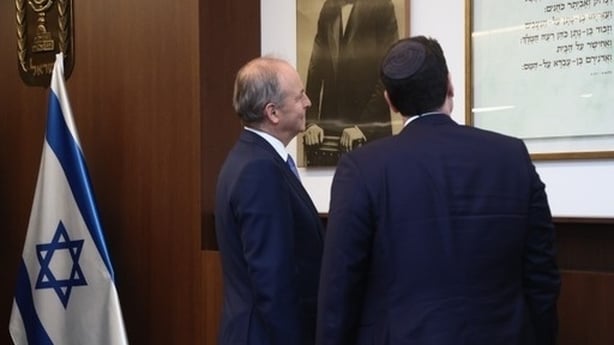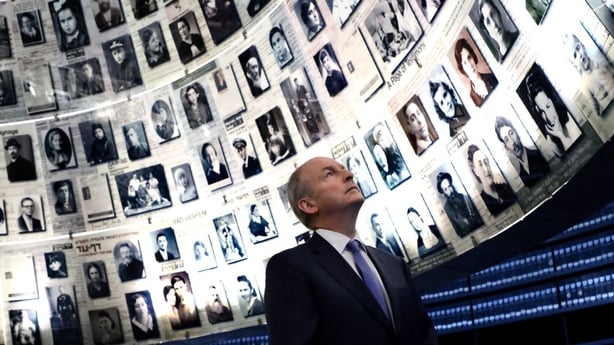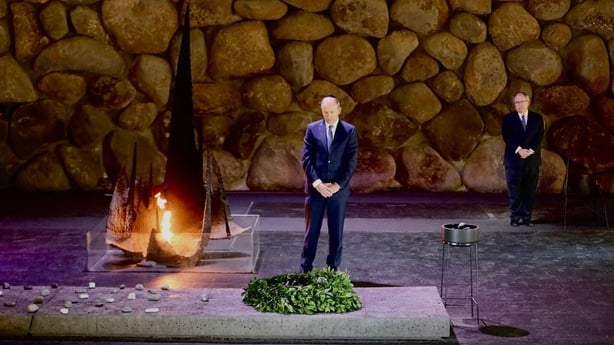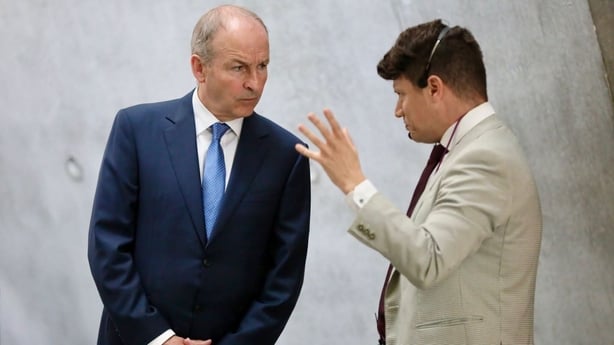Tánaiste Micheál Martin said that he does not see any signs of an immediate change in direction in the Israel-Palestine conflict following a meeting with Israeli Prime Minister Benjamin Netanyahu in Jerusalem.
Mr Martin said that he explained Ireland's perspective on the conflict to Mr Netanyahu and raised objections to illegal Jewish settlements in the occupied West Bank.
The Tánaiste told the Israeli leader that the settlements "run contrary to the realisation of a two-state solution and to normalisation of the situation between Palestine and Israel".
Ireland has long supported such a solution, which would establish a Palestinian state alongside Israel.

Following a series of political meetings and conversations, Mr Martin said that he did not see "see any immediate signs of any change in direction" from Israel.
"We're consistently witnessing ongoing settlements and expansion which, over time, would result in significant difficulties around the viability of a two-state solution," Mr Martin said.
"But we are committed, and the Israeli government are committed to – they've said to us that they're committed to resolving the issue," he added.
Since Mr Netanyahu returned last December as prime minister at the helm of the most far-right government in Israeli history, the region has experienced its bloodiest period since 2005, when Palestinians launched a major uprising known as the Second Intifada.
The United Nations estimates that 200 Palestinians and around 30 Israelis have been killed in the West Bank and Israel so far this year.
Mr Netanyahu's government is a coalition of hardline nationalists, staunch conservatives and activists who believe that Jewish settlements in the occupied West Bank, which Israeli forces captured in 1967, should be expanded.
They refer to it by its biblical names, Judea and Samaria, and believe it to be the birthright of the Jewish people.
The number of settlements in Palestinian territory has grown rapidly this year, and the Israeli government has approved plans for thousands more housing units in the West Bank.

Mr Martin also laid a wreath at the World Holocaust Centre in Jerusalem, in memory of the six million victims of the Holocaust.
A visit to the centre, known as Yad Vashem, was Mr Martin's first engagement on his three-day visit to Israel, the occupied West Bank, and Jordan.
He said that the Holocaust had made him conscious of the fact that Ireland should open its doors to Ukrainian refugees.
Mr Martin was asked if his visit to the centre made him regret that Ireland did not take in many Jews during World War II.
Honoured, humbled and moved to be at Yad Vashem in Israel today.
— Micheál Martin (@MichealMartinTD) September 5, 2023
It is very important we never forget what happened during the Holocaust, or the enduring lessons learned through the darkest period of human history. pic.twitter.com/8ZakYC1JBk
"In the current context, this is why I was so anxious that we would open the doors to Ukrainian refugees who are fleeing the worst war in Europe since World War II," he replied.
"I think we should remind ourselves of that."
In the Hall of Remembrance, the Tánaiste also laid a stone in line with Jewish tradition and rekindled the Eternal Flame.
Visits to Yad Vashem are usually customary for foreign leaders who visit Israel.

On a tour of the centre, which contains the names of 4.8 million Jews murdered in the Holocaust, Mr Martin was given a tour by Dr Jonathan Matthews, who leads the photo archives at Yad Vashem.
Dr Matthews conducted extensive research in Ireland for his doctoral dissertation on Irish revolutionary literature.

Speaking afterwards, Mr Martin said it was "extremely important" that what happened during the Holocaust is not forgotten, calling it "the darkest period in human history".
"As time passes, we continue to remember, because it is the most effective way of showing our determination to honour the six million men, women and children who perished."
Mr Martin said it was fitting that he should begin his visit here, given a worrying rise in anti-Semitism across the world.
'A very false connection'
Tánaiste Micheál Martin has denied that there is any connection between perceptions in Israel that Ireland is anti-Semitic and Éamon De Valera's decision to pay condolences to the German government when Adolf Hitler died.
"I think it's a very false connection and a very shallow one and doesn't have any substance," Mr Martin said in Jerusalem.
The Tánaiste said that he had not discerned any such suggestion from his engagements in Israel that Ireland is anti-Semitic.
"There was no suggestion at all that Ireland was anti-Semitic. I just have to say that. And we have a strong record internationally in relation to remembrance of the Holocaust," he said.
In May 1945, then taoiseach, Mr De Valera expressed condolences on Hitler's death to Germany's ambassador to Ireland, under the guide of Ireland's strict policy of neutrality during World War II.
Mr De Valera's actions have been referred to in recent years in Israeli media.
Mr Martin noted that Mr De Valera personally supervised the writing of the Irish constitution, which formally recognised the Jewish religion. The reference was removed in the 1970s, when the special status of the Catholic Church was also excised in the wake of the the Fifth Amendment of the Constitution.
In 1966, the Jewish Communities of Ireland planted the Éamon De Valera Forest near Nazareth, in honour of the then president, in recognition of the inclusion in the constitution.





